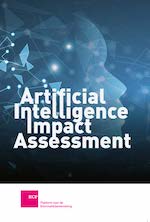Other tools
Artificial intelligence
Like any technical innovation artificial intelligence offers both promises and risks. The following documents and guides may be useful to help mitigate the risks.
 AI Impact Assessment: The public debate around AI has developed rapidly. Apart from the potential benefits of AI, there is a fast growing focus on threats and risks (transparency, privacy, autonomy, cyber security et cetera) requiring
a careful approach. Examples from the recent past (smart meters, ov- chipkaart (the smart card for public transport)) show that the introduction of IT applications is not insensitive to the debate about legality and
ethics. This also applies to the deployment of AI. Mapping and addressing the impact of AI in advance helps to achieve a smooth and responsible introduction of AI in society.
AI Impact Assessment: The public debate around AI has developed rapidly. Apart from the potential benefits of AI, there is a fast growing focus on threats and risks (transparency, privacy, autonomy, cyber security et cetera) requiring
a careful approach. Examples from the recent past (smart meters, ov- chipkaart (the smart card for public transport)) show that the introduction of IT applications is not insensitive to the debate about legality and
ethics. This also applies to the deployment of AI. Mapping and addressing the impact of AI in advance helps to achieve a smooth and responsible introduction of AI in society.
What are the relevant legal and ethical questions for our organisation if we decide to use AI?
The AIIA helps to answer this question and is your guide in finding the right framework of standards and deciding on the relevant trade-offs.
- An easily accessible introduction into AI is provided by the National AI-Course. Currently only available in Dutch, but the English translation will be available soon. The course addresses both the opportunities and challenges of AI..
Televulnerability
The Dutch Authority for Digital Infrastructure helps organisations become aware of the risks of failure or disturbance of telecommunications and other digital services.
- The Quickscan digital continuity (in Dutch) provides a good starting point. After completing the quickscan you will know how well-prepared your organisation is in case of failure of telecommunications and IT and you receive suitable advisories.
- The Authority offers multiple other tools, on their website, mostly in Dutch.

